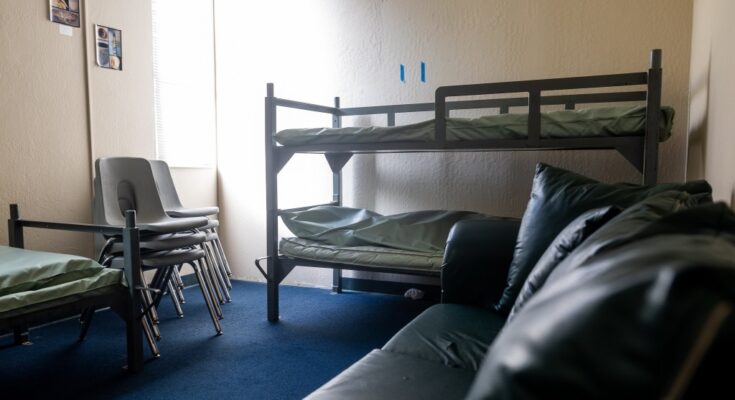In 2021, Julio Franco had struggled with substance abuse for ten years. He was addicted to meth and psychotic, struggling to tell what was real and what wasn’t. He cycled in and out of hospital emergency rooms.
Franco, 34, said: “My body couldn’t take it anymore.
The first step toward permanent sobriety for the Redwood City native was a detox center run by the nonprofit Star Vista in Burlingame, where he stayed for three weeks and weaned himself off methamphetamine. with the help of trained personnel. Once he was stable, he entered the inpatient unit. Franco said he has been clean since then and works as an addiction counselor at Star Vista.
Detox is an important place to stay for addicts. But San Mateo County, the fifth largest in the Bay Area, has only one operating detox center after Star Vista closed its detox center in October.
The reason? The nonprofit organization no longer has enough money from the state health care agency to keep its doors open, said Chief Clinical Officer Shareen Leland. Changes to Medi-Cal, the health care provider for low-income Californians, have changed the way it pays providers like Star Vista. That went into effect in San Mateo County in July.
“This puts an incredible strain on the care network,” Leland said. “It’s a big deal.”
A major sponsor of behavioral health services, Medi-Cal used to cover the cost of detox. But thanks to CalAim, a major expansion of the program, San Mateo County providers are no longer reimbursed for services, meals and transportation for clients, or other expenses they say are essential to the programs.
CalAIM, which began in 2022, is an extension of Medi-Cal that allows health insurance to pay for certain things not considered traditional medical care — such as services to help Californians who are homeless find and maintain housing. Supporters say it has brought much-needed funding to the state’s overburdened homelessness system.
Although CalAim increased coverage for housing and social services, it also changed the way treatment providers are paid for their services. That amounts to a cut in funding for many, spokespeople and a district official said.
A spokesman for the California Department of Health Services, which oversees CalAim, did not respond to a request for comment by press time.
The shutdowns and disruptions come as California prepares to implement Proposition 36, which took effect Wednesday. The voter-approved measure tightens penalties for people convicted of repeated shoplifting and drug crimes, with the goal of diverting more people from health care. It is widely expected to put significant pressure on the existing shortage of treatment providers in the Bay Area.
Star Vista managed to get $177,000 this summer, Leland said. In early December, the nonprofit Caminar closed a crisis home in Redwood City for critically ill and addicted people who had just been released from prisons and emergency rooms, said Chief Executive Officer Mark Cloutier.
Free at Last, a rehab program in East Palo Alto, also plans to cut costs, said Executive Director Gaynell Mays. He said the nonprofit has an 80% gap between what it costs to provide inpatient and outpatient programs and what Medi-Cal pays now.
“It leaves us very vulnerable, along with all the other providers,” Mays said. Nobody is happy.
Concerns among San Mateo County donors follow similar cuts in Santa Clara County last year due to CalAim. Momentum, one of Santa Clara County’s largest nonprofit behavioral health services providers, has closed six of its programs and laid off 85 employees by the end of December 2023.
Because counties implement the reforms at different levels, the effects are uneven across the state. But according to Cloutier, the new reimbursement rates under CalAim aren’t enough for providers in some Bay Area counties.
“It’s very sad,” Jei Africa, director of health and behavioral services for San Mateo County, said of CalAim’s impact. “The new state fees, as a result of the CalAim payment change, have affected many organizations in this state.”
Africa says treatment options like the closed detox in Burlingame are desperately needed, and the county is helping providers adapt. His office has asked CalAim administrators to recalculate payment rates to better account for the district’s high cost of doing business, he said.
However, Africa hopes that the change will make suppliers more efficient by reducing administrative costs and working “more efficiently”.
For example, Africa said the Star Vista detox was only 39% full between July and October this year. When the district’s providers referred potential clients their way, staff sometimes refused to take them because the agency was short-staffed, he said. That is a nationwide moral health challenge.
But Leland says the county doesn’t provide enough clients to detox. He said the authorities suggested that Star Vista should do more services with potential customers to fill the beds.
Detox was small, with four beds in a warehouse-like building in a commercial area. Generally, two or three of those beds were full at one time, Leland said.
Its customers were men like Franco with long-term addictions to fentanyl or meth, who often came from the San Mateo Medical Center. Many were obese and needed medication, counseling and emotional support before they were ready for residential treatment, Leland said.
When the detox closed in October, those clients were moved to other programs, he said. Because of the lack of funding, Star Vista is also scaling back its addiction treatment program for women living in “unsupportive settings” such as homeless shelters, Leland said.
Ironically, the Medi-Cal reform that pressures San Mateo County providers generally increases state support for public services and vulnerable residents.
Under Gov. Gavin Newsom, CalAim launched a $12 billion expansion of Medi-Cal by 2022 to provide comprehensive services beyond what is traditionally considered health care, such as housing . When the reform began, nearly half of Medi-Cal’s $133 billion annual budget was spent on 5% of its population: the poorest people struggling with homelessness, poverty, substance abuse of drugs and mental illness, CalMatters reports.
Proposition 1, which voters narrowly approved in March, would free up $6.4 billion in bonds to fund thousands of new psychiatric treatment beds. But Cloutier said that would fund construction, not ongoing funding for treatment providers. He called for officials to reevaluate CalAim’s impact.
“There’s a systemic issue here,” Cloutier said. “The state needs to address this.”
#Californias #massive #health #care #expansion #unintended #consequences #Closing #addiction #mental #health #treatment #options



